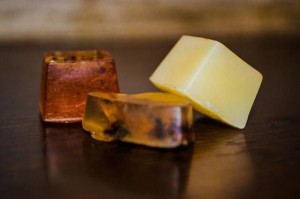
Rebecca Paul says making organic soaps is not difficult and it certainly need not be so expensive
Rebecca Paul’s foray into organic soap making came courtesy of her sister. Paul, who had worked in sales and marketing in Chennai for over five years, was taking a break after the birth of her first child. “I was bored and didn’t know what to do with myself. My sister signed me up for a workshop,” she giggles. “She didn’t even tell me till that morning when she pushed me out of the house.”
The other factor that led her to take this seriously was the fact that her baby had sensitive skin. “I tried all kinds of branded stuff but nothing helped, not even the green gram flour that we traditionally use. Finally I started making specific soaps for him and that’s when we began to see a difference.” This led her husband Deepak also to start using her soaps and, when she realised that it was helping him as well, Paul plunged whole heartedly into the business of making organic soaps.
Her initial products were gifted to family and friends and slowly, as word spread, she began getting other customers. “I started with a sample pack, which had nine different varieties. So that allowed people to choose the variety they wanted. And the orders started to come in.” A large portion of her orders comes from Coimbatore but she has sent her stuff to places like Chennai and Andaman Islands. “One person who was using my soaps went to Dubai and continues to order from there,” she smiles. Paul retails through her Facebook page, The Kraft Farm, and in various exhibitions.
Her soaps are made of two different processes: cold processed and melt-and-pour. The latter is easier, so she teaches that at her workshops. “A readymade base is available, so one just has to melt and add the other ingredients, fragrances and colours. It’s so simple, even a child can make one.” Ask about the problem of sourcing ingredients and Paul returns a vehement “that’s easy. It’s convincing people that’s difficult.” But a lot of people are going organic, I protest. She agrees but points out that most people assume that such products are expensive. “So when I charge ₹60 or ₹70 for a soap of 100gm, they don’t believe it’s fully organic. When I set up a stall at exhibitions, I am constantly dealing with this question: ‘how can you say it’s organic when your prices are so low?’”
The other problem is fragrances. “In commercial soaps, the fragrance lasts till the last bit. But I use essential oils, which evaporate when exposed to heat. So sometimes that becomes an issue. I prefer to make according to the customer’s requirement, so I ask if they want it heavily scented or mildly.”
She has started holding workshops as well. “It’s a way to encourage people to go organic. I offer to help those who want to continue. If they need ingredients, I help them source it. Or even if they want to sell.” She goes on to narrate how one lady — who was speech- and hearing-impaired — was using this as a way to earn some extra money. “She texted to say that she had bought her daughter a gift with the money she made. It made me feel good,” she says softly. She is also working with the Indian Superheroes, a group of organic farmers from tribal and rural communities of South India, to train them and their families to make products that are then retailed on their website.
She’s also looking at increasing the number of products. “I’ve started trials of the body butter. So that should be out soon. I’m also hoping to introduce lip balm, lotion bars, beard wax for guys… I have to explain the concept of lotion bars. Not many people know about it. But still…,” she shrugs, “There’s a lot you can do with organic beauty products.”
In a lather
Most popular soaps: Goat’s milk, Shea butter, Aloe Vera and Honey
Natural colours: Turmeric for yellow, beetroot powder for red/pink, annatto seeds for orange, neem/spirulina for green, activated charcoal for black
Other products: Yarn lanterns, string art, beeswax candles, painted t-shirts
More details: Visit https://www.facebook.com/TheKraftFarm/

Please mail your detaiils